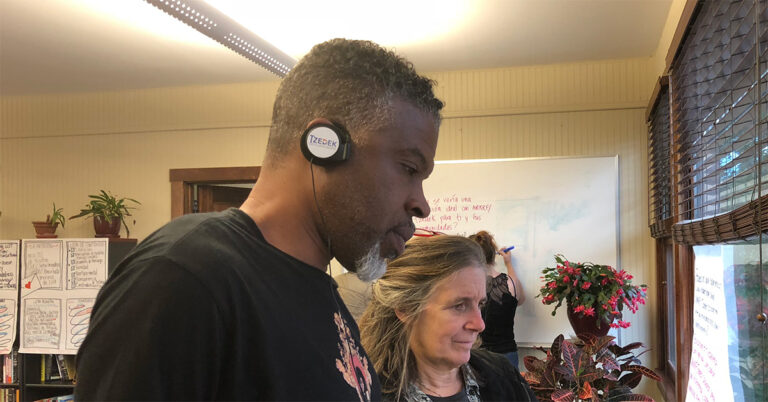Tools & Resources to Shift Power to Communities
Browse Menu
Looking at your role/function within your foundation.
What are listening practices that can shift power?
Assess how you are listening through a set of reflection questions.
Are you a donor or do you advise donors?
If you are a foundation donor — or work closely with donors — you have unique opportunities to shift your mindset from one of ownership over the organization’s wealth to one of stewarding resources into the hands and control of impacted communities. With this kind of reframing, defined by, and advanced through, listening to the people and communities your foundation seeks to serve, you’ll be creating a legacy of partnership that delivers resources where they are needed most.
Note: If you’re a fundraiser, take a look at what community-centric fundraising is all about.
Get going with these tools and resources
Join a network of funders and donor organizers committed to building relationships with social movement leaders to provide support for transformational change toward a more just and collective future.
Resource Generation offers resources and programming to young people with wealth or class privilege, or who are involved in family foundations to learn more about philanthropy around social, racial, economic, or environmental justice. Use this guidance to help you make sense of all the opportunities to give and move your money in the direction of social change efforts led by people most impacted by injustice.
This guide invites you to reflect on four principles — accountability, equity, learning, and relationships — considering the meaning of each, how they manifest in your foundation’s philanthropic purpose, and how they show up in governance, grantmaking, and operations.
Pro tip: National Center for Family Philanthropy’s website offers additional resources to help families realize the purpose and potential of philanthropy for meaningful impact.
Get inspired by what other funders are doing

Through a community-based research process that tapped the wisdom of local movement leaders and grantee partners, the Tzedek Social Justice Fund recognized that it needed board members with direct experience doing the kind of work that Tzedek funds. Founder and donor Amy Mandel stepped down from the board, and Tzedek is now governed by a board of community leaders with diverse backgrounds and lived experience.

Explore this menu to spark the changes you want to see.
Mix and match to find the examples, resources, and reflections best suited to help you and your organization shift power to the people and communities at the heart of your work.
How to use the menu
Funders are moving toward listening and participatory practices at different rates and from different starting points and perspectives. We also know that shifting power is not easy work and requires a strong internal commitment and continuous learning. It’s best to be clear on your organization’s motivations, capabilities, and goals. As you engage with this menu, consider your funding practices, operations, policies, and values — and then identify where change will best serve your foundation and the people and communities you seek to serve.
We recommend examining the menu’s resources and examples with a willingness to turn kernels of ideas into something right for you. No matter where you start or the path you travel through this menu, we suggest spending time on the reflection questions, perhaps engaging colleagues to help you and your organization better understand and prepare for what it means to listen to shift power.
Our Participatory Philanthropy Toolkit, included as a resource in the menu, has a Funder Readiness Assessment that can be adapted to different listening practices and help prepare you to make changes in your priorities and practices.
How we choose the items
We offer a range of examples and resources because there are no one-size-fits-all solutions; and we share them in a menu format so you can choose what’s interesting or relevant to you and your foundation. We don’t rank the practices or the organizations employing them or intend to signal that any featured funder has met its listening goals across the board. Each example represents only a moment in time — a practice one of your peers told us (or an intermediary) about, and that we hope might inspire you to enhance your own listening work.
Similarly, we do not rank the resources, though we did select them based on a set of criteria, including:
- We and/or our partners have personally used the resource and find it is high-quality, promotes impact, and aligns with our power analysis
- The resource is widely and publicly available (not just to paid members) and, ideally, accessible to people with disabilities
- The resource is relevant to, and includes applicable lessons for, a variety of types of funders
- The resource is as evergreen as possible
New resources are always coming online. We hope that the ones we’ve included are helpful while also sparking your curiosity and helping you forge an ongoing relationship with the creators and other aligned efforts.
We are always looking to add more funder listening examples and more resources. Please reach out to our communications manager, Debra Blum, or take a few minutes to share your stories and ideas on our Lift Up Listening online form.
Have questions about the menu or ideas for resources or examples?
Please reach out to our communications manager, Debra Blum.


